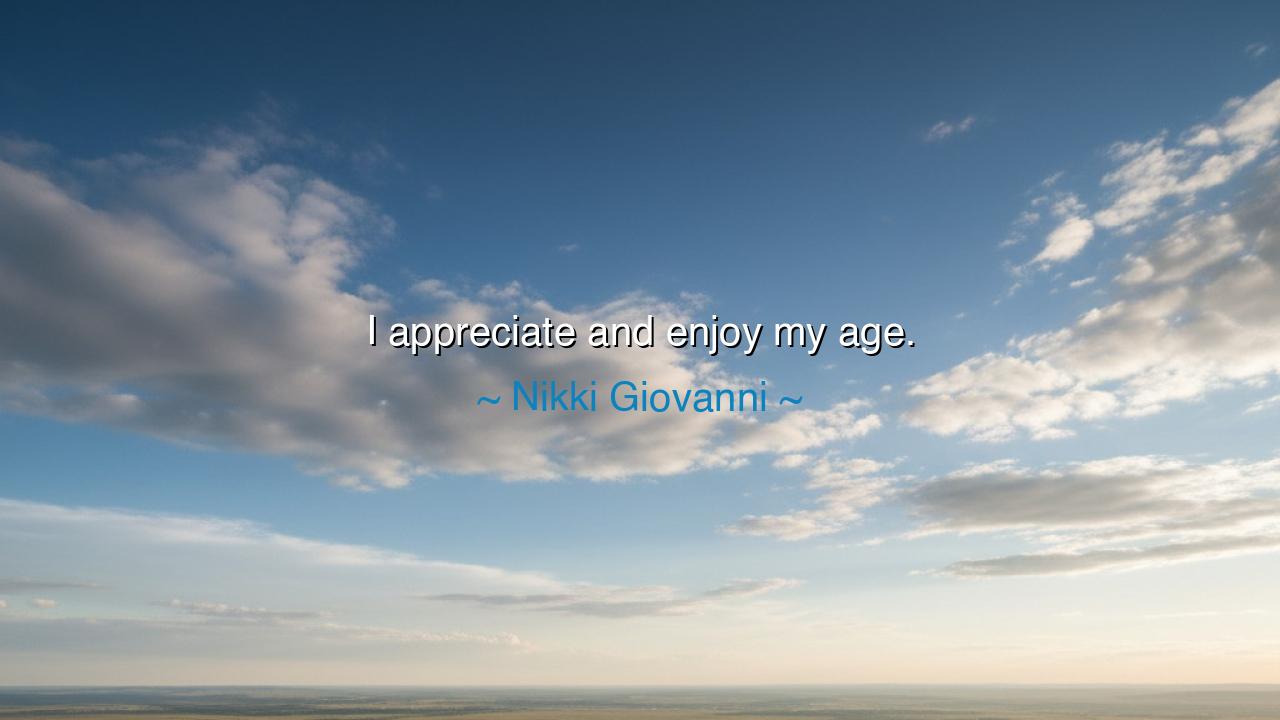
I appreciate and enjoy my age.






In the words of Nikki Giovanni, “I appreciate and enjoy my age.” Though brief, these words carry the serene authority of one who has lived, endured, and learned. Giovanni, a poet whose voice has echoed through the struggles and triumphs of Black America, speaks not with regret for the passing years, but with reverence for the wisdom they have granted her. In a world that worships youth and fears the slow unfolding of time, her declaration stands as both defiance and peace. It is the voice of one who has made peace with her seasons—who sees in age not loss, but the flowering of understanding.
To appreciate one’s age is to reject the illusion that life’s worth diminishes with time. The ancients knew this well. They saw age as the crown of experience, the moment when the fire of youth cools into the steady flame of wisdom. Where youth seeks to conquer, age seeks to comprehend; where youth burns to be seen, age glows with the quiet knowledge of having seen enough. Giovanni’s joy in her years is not vanity—it is liberation. She has arrived at a place beyond comparison, where the past no longer haunts and the future no longer frightens. In appreciating her age, she embraces her own becoming, finding beauty not in what was, but in what remains.
Nikki Giovanni’s life itself is a testimony to this truth. Born in 1943, she came of age in an era of transformation—the Civil Rights Movement, the rise of Black art and poetry, the reshaping of identity in America. Her words gave voice to those who had been silenced, her poems both tender and fierce. Through decades of creation, she witnessed the passing of generations, the evolution of society, and the unfolding of her own soul. Her acceptance of age is not mere comfort—it is a celebration of survival. To her, each wrinkle is not a mark of decay but a line of history, each year another verse in the poem of a life fully lived.
The ancient poets too spoke of such joy in aging. The Roman philosopher Cicero, in his writings on old age, declared that “the fruits of age are richer than those of youth, though they ripen more slowly.” So it is with Giovanni’s words. To “enjoy” one’s age is to taste these fruits—to savor the calm of experience, the freedom from the restless hunger of earlier years. She teaches us that every age has its own beauty, and that life is not a mountain with one shining peak but a series of gardens, each blooming in its time.
Consider also the life of Maya Angelou, Giovanni’s contemporary and friend. Angelou, too, spoke often of age with affection, saying, “Most people don’t grow up. Most people age. They find parking spaces, honor their credit cards, get married, have children, and call that maturity. What that is, is aging.” For her, as for Giovanni, true aging was not a decay of body but an awakening of spirit. Both women remind us that to age well is not merely to exist through time, but to evolve with it—to greet each decade as a new teacher, not an enemy.
Giovanni’s quote also carries a quiet rebellion against a culture that fears age, particularly for women. In societies obsessed with youth and beauty, she claims the radical joy of self-acceptance. To appreciate one’s age is to resist erasure—to say, “I am still here, still radiant, still whole.” Her wisdom echoes like that of the matriarchs of old—the storytellers, the keepers of memory, the ones who know that the beauty of a flame is not in its first spark, but in the constancy of its burn. In this way, Giovanni restores dignity to the passage of time, showing that the fullness of life lies not in eternal youth, but in eternal presence.
The lesson, my child, is this: revere the passing of your days, for each one is a teacher. Do not mourn the youth that fades, but cherish the perspective that deepens. Seek joy not in how you look, but in how you see. Fill your later years not with longing, but with gratitude—for every scar that taught you strength, every failure that made you humble, every morning that found you still alive. To appreciate your age is to stand in harmony with time itself, neither fighting nor fleeing it, but walking beside it as an old friend.
So let Giovanni’s wisdom be your guide. When you wake each day, give thanks for the breath in your lungs, the lines on your face, the stories in your soul. Let age be not your enemy, but your masterpiece. For those who, like Nikki Giovanni, embrace the rhythm of their years will find that the greatest beauty is not in the spring of life, but in the golden light of its enduring autumn.






AAdministratorAdministrator
Welcome, honored guests. Please leave a comment, we will respond soon